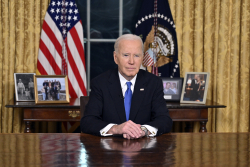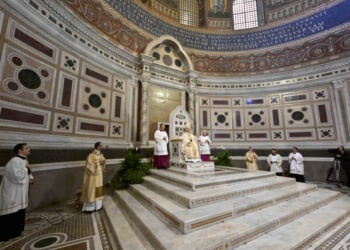President Donald Trump has the opportunity to build the foundation of regional peace. One way to do so is through education about one of history’s worst atrocities.
President Trump stirred unexpected emotions across the Arab world last November when, during a campaign interview with a major Arabic-language channel, he spoke about his grandson’s half-Arab heritage. It was a rare moment of personal candor—one that resonated in a region where U.S. presidents are often perceived as distant figures in high-stakes diplomacy.
As he tours the Middle East this week, Trump has another opportunity to speak not just as a statesman but as a grandfather. If he were to share his hope that both his Jewish and Arab grandchildren might one day travel freely between Riyadh and Jerusalem, he would offer more than a symbolic gesture. He would present peace not just as policy but as a deeply human aspiration.
Yet, for that vision to be more than aspirational, it must be grounded in truth and understanding. Symbolic gestures can inspire, but they need substance to endure. One of the most meaningful ways to build that foundation is by advancing Holocaust education across the Arab world.
In most Arab countries, the Holocaust is either omitted entirely from school curricula or referenced only briefly within general discussions of World War II. Political sensitivities surrounding the Israeli-Palestinian conflict have made many governments wary of highlighting Jewish suffering, fearing it could be construed as legitimizing Israel. The result has been multiple generations raised without meaningful exposure to one of the most consequential atrocities in modern history. In that vacuum, conspiracy theories, denial, and extremist narratives have found space to proliferate.
Encouraging Arab nations to teach the Holocaust would serve both moral and strategic American interests. First, it would help undermine the appeal of violent ideologies. Radical groups often manipulate historical ignorance to recruit and radicalize young people. Teaching students about the horrors of totalitarianism, genocide, and antisemitism provides them with the intellectual tools to question propaganda and reject hateful messaging.
Second, it would reinforce America’s global commitment to human rights and historical truth. The Holocaust is not only a Jewish tragedy—it is a universal warning against the dehumanization of any people. The horror underscores the importance of human dignity, liberty, and the rule of law, all principles the United States aims to promote in its foreign policy. Elevating those lessons abroad strengthens the credibility of U.S. leadership.
Third, and perhaps most urgently, Holocaust education can support the long-term cultural groundwork for regional peace. Diplomatic accords are essential, but reconciliation between peoples requires empathy and recognition. Teaching the next generation about the catastrophic consequences of hatred can foster a climate more conducive to coexistence between Arabs, Israelis, and others in an increasingly interconnected region.
Crucially, this initiative should not be framed as an American imposition. Rather, it should be offered as a collaborative project rooted in universal values and tailored to regional contexts. Some Arab countries are already undergoing educational reforms. Consequently, there is room to integrate Holocaust education within broader programs focused on global history, human rights, and tolerance.
The Trump administration has multiple tools to help advance this effort. Diplomatic engagement should encourage Arab allies—especially those participating in the Abraham Accords or pursuing internal reforms—to include Holocaust studies as part of their broader civic and historical education strategies. This message can be framed as part of a regional stability agenda rather than as an endorsement of any particular political position.
U.S. foreign aid also provides a practical lever. Education and democracy promotion funds can be directed toward localized curricula development, teacher training, and civil society programs focused on combating extremism through historical awareness. These investments need not come in the form of heavy-handed directives but rather through partnerships that respect national sovereignty while promoting shared goals.
Multilateral action is key as well. The administration can work with international bodies—or build new coalitions—to create and distribute quality materials, support teacher exchanges, and recognize governments that take meaningful steps in this direction. Countries like the United Arab Emirates and Morocco, which have already made strides in promoting interfaith tolerance, can serve as early adopters and regional models.
President Trump has shown a willingness to challenge conventional wisdom in the pursuit of breakthroughs, from moving the U.S. embassy to Jerusalem to brokering the Abraham Accords. He now has the chance to take another bold step—one that connects the personal with the political, the moral with the strategic. By speaking of his grandchildren’s intertwined Jewish and Arab heritage and backing that message with a call for historical truth, he can help build not just a legacy of diplomacy but a foundation for durable peace.
About the Author: Haisam Hassanein
Haisam Hassanein is an adjunct fellow at the Foundation for Defense of Democracies. Follow him on X: @HaisamHassanei1.
Image: Noamgalai / Shutterstock.com.


















